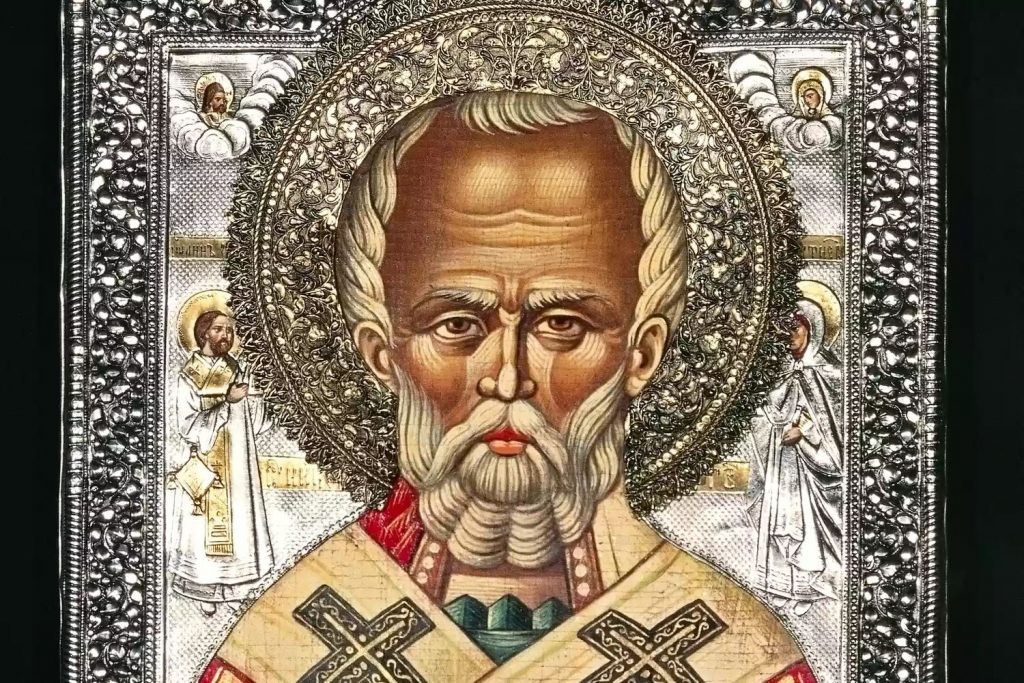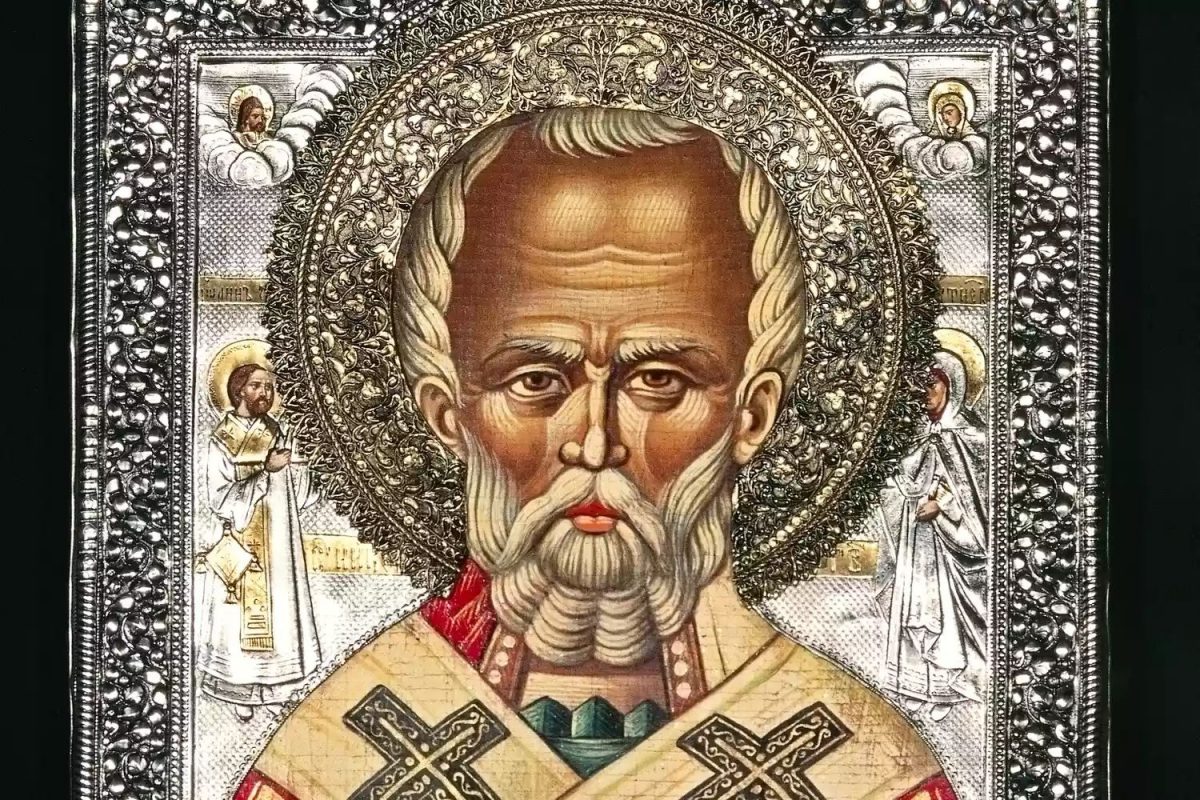
Sermon for Bramley St Peter, 3 December 2022
Readings: 1 Corinthians 1:3-9 ; Luke 14:12-14
The congregation were first of all asked some questions, which set the scene for the rest of the talk…
- What do the following have in common: the City of Aberdeen, the Royal School of Church Music, the Duchy of Lorraine, and the Greek Navy? Their patron saint is St Nicholas.
- When is the feast day of St Nicholas? 6 December.
- Who visited this church last weekend and has recently written a book that features St Nicholas? Bishop Arun. His book is titled “Stick with Love”
- Here’s the last question, which may seem unrelated but isn’t, as we’ll see shortly. I read something recently about a woman who was criticised on social media for (quote) ‘only’ spending a hundred pounds on each of her children at Christmas. We don’t have children ourselves, and I’m a bit out of touch with these things. So, I looked online to find out the average amount that British parents do spend on each child? According to a recent survey, is it (a) £35, (b) £70, (c) £100 or (d) £190? Answer either (c) or (d): Median £100, Mean £190. In other words,the woman in the story was being criticised for being average, and that’s what commercial pressure does to us – it pushes up expectations.
Let’s draw those threads together. Arun’s book takes us through the season of Advent, which starts today, looking at a famous Christian each day to see what we can learn from them. Some are historical saints; others have become famous in our own time. Saint Nicholas appears of course on 6th December. He was a real person, a Christian bishop in what is now Turkey about three hundred years after the time of Christ. Historically he was one of the most widely celebrated Christian saints of all time.
What he was most known for was his generosity to the poor. One famous story about him is that there was a man who had lost all of his money. The man could not afford proper dowries, that is wedding gifts, for his three daughters. This meant that they would remain single, unemployed, and living in poverty. Hearing of the girls’ problems, Nicholas decided to help them, but, bearing in mind Jesus’ advice to do good deeds in secret, he went to their house under the cover of darkness and threw a purse filled with gold coins through the window (windows didn’t have glass in them, in those days). The father could then afford for his daughters to be married. It was only later he found out where the money came from. (So now you know where we get the idea of hanging bags of gold coins on the Christmas tree!)
I think Nicholas may also have been motivated by what Jesus taught in today’s reading about being generous to those who can’t repay us, rather than giving only to those who we expect to give us a present in return. That’s something to bear in mind this Christmas. How do we decide who we give presents to, or what particular present to give?
Think particularly about gifts for children. Our motivation might be their pleasure – what are their hobbies and interests? It might be education – what books, toys or games will help them develop useful skills? It might be to develop talent, if they are into sports, arts or music. But there’s nothing wrong with adding something just for celebration – sweets or other food as a treat, for example.
This year, as the environmental crisis looms ever larger, more people are thinking not only of how their gifts might help the person who receives them, but also the human and environmental impact: where was that present made and who made it, how long will it last, and can the materials and packaging be recycled? Now’s not the time to go into this in detail, but you may want to look up A Rocha’s ‘twelve tips for a greener Christmas’ – the suggestions include cooking or buying a meal for that person who has everything, or a gift of your time.
But going back to the season of Advent, what we are really doing in this season is not just decorating our homes and wrapping presents to celebrate Christmas with our families, important though that is. Advent is about preparing our hearts to receive God’s greatest gift. Another question (clue in the title of the book!)
Final question: What is God’s greatest gift to us? His love!
God’s greatest gift to us is not measured in pounds (or if you must, it was about seven pounds, give or take). And like Nicholas’s gift of a wedding dowry, it was given at night, to a family in a poor home. God’s greatest gift is his welcoming, forgiving love, shown most clearly in coming among us as Jesus Christ: baby and man, teacher, healer, prophet, and through his death our Saviour and Lord. Look again at that reading from the letter to the Corinthians: six times in those seven verses Paul mentions Christ. Four of those times he is given his full title: Our Lord Jesus Christ. It was so important to Paul that his Christian hearers understood this. In calling Jesus ‘Christ’ we recognise that he is God as well as man, and in calling him ‘Lord’ we recognise that he has a claim on our lives.
St Nicholas understood this. Leaving aside the legends, we do know that he attended an international conference of bishops in his day that agreed the words of the Creed. Nicholas stood up strongly against those who said Jesus was only a man, and also those who said that being a Christian was just about being good. Nicholas knew that Jesus was also God in human flesh – as we sing in a well-known Christmas carol, “Very God, begotten, not created” – and that it is through his goodness, not our own, that we are saved.
Which brings us, at last, to the question of baptism. Mary and Jimmy have brought their children to be baptised, or christened, in recognition that Quin and Joy are indeed God’s gifts to their family. Unique gifts, each to be treasured for how they are, as God made them. They are christened in recognition that God gave his own son, Jesus, as his greatest gift to each one of us. Together as a family they pledge themselves to come to Christ, to turn to Christ for his guidance, and to follow Christ as part of his family, so that as the children grow, they can receive and grow the spiritual gifts that the Holy Spirit wants to give them.
What about the rest of us? Well, this Christmas, the best presents we can give to our children, or indeed anyone we care for, are our love and faith. As the Bishop titled his book, let’s ‘stick with love’. That is the most precious and lasting gift of all. If we offer presents as well, let’s choose those that reflect our love for God and family, and our care for the world he has given us. Thoughtful gifts that don’t cost the earth, or break the bank, or expect anything in return. But don’t forget the treats!
And finally, this Advent we’re hanging decorations on our tree each week as we mark the themes of the season. Today we have this one representing ‘GIVING’, with an icon of St Nicholas on the back.
